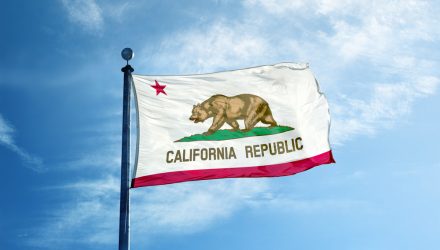California is extending its reputation for forward-thinking carbon reduction and climate change policy. Lawmakers there recently passed two pieces of legislation that could prove relevant to investors.
One bill, if it becomes law, would mandate that companies based in the Golden State release details annually about potential climate-related risks. Another proposal would require large companies doing business in the state to disclose greenhouse gas emissions. Gov. Gavin Newsom (D) hasn’t publicly commented on the bills. But they could head to his desk as soon as next month.
Should he sign one or both pieces of legislation, a variety of exchange traded funds could be affected, including the Invesco ESG Nasdaq 100 ETF (QQMG). The Climate Corporate Data Accountability Act, or SB 253, if passed, would require public and private companies with revenue of at least $1 billion to report yearly Scope 1 and Scope 2 emissions. That mandate would apply to a variety of QQMG member firms. Though given the ETF’s ESG purview and established climate commitments by many of the ETF’s holdings, that requirement shouldn’t be onerous.
The Climate-Related Financial Risk Act, or SB 261, is the mandate that companies with a minimum of $500 million in annual sales doing business in California – traits applicable to nearly every QQMG holding – to detail climate risks to state regulators.
California Reality for QQMG
The aforementioned pieces of legislation are relevant to investors considering QQMG for multiple reasons. First, a slew of QQMG’s 91 holdings, including six of the top 10, are based in California. Second, owing to the state’s population and massive economy, even the QQMG components that aren’t based there are doing business in the Golden State. And they are potentially generating significant sales in that market.
“Until now, companies have reported scope 1 and scope 2 emissions voluntarily. Scope 3 emissions, which account for the majority of emissions, are extremely difficult for companies to assess and report. California already has some caps on emissions. Last year, the state passed a law mandating net-zero carbon pollution by 2045,” noted Morningstar analyst Leslie Norton.
Also notable to investors considering QQMG, is that California climate policy often starts in a vacuum. But it can be adopted by other states. Additionally, assuming the aforementioned bills become law, federal regulators could be keeping watch on the impacts.
“Meanwhile, sometime soon, the SEC is expected to release its finalized set of climate disclosure rules. (It released its proposed rules in 2022 and invited comments.),” concluded Norton. “These include disclosures about scope 1, 2, and 3 emissions, as well as climate-related risks and their impacts on business and the company’s outlook.”
For more news, information, and analysis, visit the ETF Education Channel.








